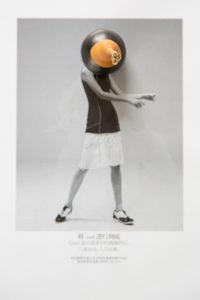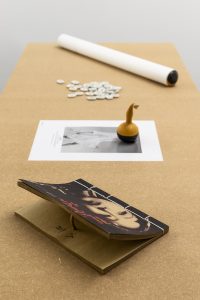This website uses cookies so that we can provide you with the best user experience possible. Cookie information is stored in your browser and performs functions such as recognising you when you return to our website and helping our team to understand which sections of the website you find most interesting and useful.
A project by Kristina Inčiūraitė
Curated by Benedetta Carpi De Resmini
16 September – 26 October 2019, AlbumArte, Rome
The exhibition Reflecting Women focuses on the concept of female identity. When Simone de Beauvoir declared ‘one is not born but, rather, becomes a woman’, she was affirming that gender is not a stable identity but an individual constructed in continuity over time. In the aftermath of the Golden Lion won at the 58th edition of the Venice Biennale by the three artists of the Lithuanian pavilion, the exhibition opens a reflection on one of the theme of female identity, through the eyes of one of the most renowned artists on the Lithuanian scene: Kristina Inčiūraitė.
Reflecting Women focuses on the concept of female identity. The title indicates a reflection on gender, a genre generally established through the stylization of the body. Reflecting expresses not only the analysis of the female figure, but also a reflection understood as a perception that each of us has through the observation of others. Indeed, nobody can observe herself/ himself, except in a mirror. And yet a mirror can also show a distorted image, like the one that every woman receives from the female iconography of contemporary society.
The project was promoted by the Embassy of the Republic of Lithuania in Italy and implemented thanks to the support of the Lithuanian Council for Culture, i-Portunus (a project selected and supported by the Creative Europe Programme) and the Lithuanian Culture Institute.
THE FRAGMENT AS A PROVERB
A project by Kristina Inčiūraitė
12 October 2019, MAXXI, the National Museum of 21st Century Arts, Rome
The musical performance The Fragment as a Proverb invites to listen to different fragments of popular songs and analyse personal and collective memory. In our technologised culture, song recordings have become widespread so they have become part of our memory. Agnès Jaoui, the screenwriter of Alain Resnais’ film Same Old Song (On connait la chanson, 1997), once said that by picking popular songs for film, she used fragments of songs like proverbs. The trivialities in the words of popular songs summarise the feelings, and at the same time impoverish them. Kristina Inčiūraitė amplifies this impoverishment by using an even more reduced form of song (humming or whistling) in this performance. Various pieces of music are performed by singers individually: the participants select listeners randomly, and then hum a selected popular tune into their ear, while the rest of the audience waits for an intimate experience. Thus, the intimate relationship created between the singer and each listener is an enhanced experience – the melody becomes a vehicle for memories and emotions.
Subsequently, the famous Japanese whistler Mariko Takagi whistles fragments of American songs popular in Japan, while private photographs are represented in a video projection. This video tells about the contradictions in American culture, which influenced Japanese society after the First World War, leaving an echo of broken promises.
The performance was held at the Architecture Archives Centre of MAXXI, the National Museum of 21st Century Arts, on the occasion of The Day of Contemporary Art organised by the Association of Italian Museums of Contemporary Art, with the collaboration of the whistling virtuoso Mariko Takagi, the Choir Master Massimiliano Tonsini and the Choir of the National Academy of Santa Cecilia.










